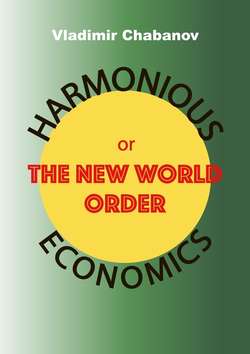Harmonious Economics or The New World Order

Реклама. ООО «ЛитРес», ИНН: 7719571260.
Оглавление
Владимир Емельянович Чабанов. Harmonious Economics or The New World Order
Introduction1
I. General theory of harmonious economy
Chapter 1. Economics as a science
§1.1. Culture and Economics
1.1.1. Place of economics in the world knowledge system
1.1.2. Differences between western and eastern cultures and their influence on the economic structure
1.1.3. Russia and Europe, collision of civilisations
§1.2. Economic objectives and tools
1.2.1. What is economics?
1.2.2. Fundamental purpose of harmonious economics
1.2.3. Human needs, commodities and production means
§1.3. Social labour productivity and its constituent factors
1.3.1. Structures of modern economics
1.3.2. Social labour productivity as key indicator of state functioning
1.3.3. SLP suppressing factors
1.3.4. Productive economic factors
1.3.5. Labour differentiation and cooperation
Chapter 2. Economic systems and their peculiarities
§2.1. Market and administrative connections within economic structures
2.1.1. Advantages and disadvantages of market connections
2.1.2. Power and administration
2.1.3. Comparison of the market and the administrative regulators’ qualities
§2.2. Economic systems and their features
2.2.1. Characteristic features of various politico-economic entities and their potential
2.2.2. Analysis of capitalist system
2.2.3. Socialist system typical features
2.2.4. How the USSR was destroyed
2.2.5. Properties and productive capacities of neo-colonial countries
2.2.6. Harmonious form of social organisation
§2.3. General theory of economic systems
2.3.1. Economic systems and their properties
2.3.2 Principles of functioning of economic systems
2.3.3. Connections within highly organized systems
2.3.4. Special features of formation of highly organized economic systems
II. System-forming measures for harmonious economy
Chapter 3. Labour and money, their unity and indissoluble connection
§3.1. Labour and its characteristics
3.1.1. How can human labour be measured?
3.1.2. Social labour intensity of commodities (SLIC) as key parameter of enterprise work
3.1.3. Value and value-forming factors in harmonious economics
§3.2. Money and its transformation in modern global conditions
3.2.1. Money, its evolution and forms
3.2.2. Fundamental drawbacks of modern money
§3.3. Principles of formation of a highly organised financial system
3.3.1. Labour and money
3.3.2. Velocity of money circulation and its dependence on the state of economy
3.3.3. Founding of a reliable financial system
3.3.4. Setting up an equal foreign trade of states, and the result of implementation of the new financial system
3.3.5. Price structure and its influence on economy
Chapter 4. Harmonisation of economic activities of enterprises and regions
§4.1. Labour remuneration and its economic impact
4.1.1. Requirements for effective labour remuneration. Pareto principle
4.1.2. Difficulties of adopting a harmonious form of labour remuneration
§4.2. Organisation of the collective consumption system
4.2.1. Taxes as a tool for financing of collective and social needs of the population
4.2.2. Principles of formation of a harmonious tax system
§4.3. Organisation of administrative governance system
4.3.1. General recommendations on organisation of efficient administrative governance
4.3.2. Nature of administrative governance in a harmoniously organized
4.3.3. Funds economic management mechanisms
Chapter 5. Program for creation of a harmonious and successful territory (Ladzemlya)
§5.1. Program subject and methods
5.1.1. Ladzemlya: founding principles
5.1.2. Measures required for creation of a Ladzemlya
§5.2. Description of specific Program measures
5.2.1. Auxiliary measures and control of their implementation
5.2.2. Assessment of socio-economic consequences of implementation of the Ladzemlya Program
Conclusion
References
Отрывок из книги
Estimated readers!
The book you are holding in your hands is about economics. However, its subject is not the economics that we witness today, but economics the way it should be. This book is about economics that would create a stable and violence-free world where all people would have an opportunity to provide a dignified living for themselves and their families. About economics that would conform with the common sense and respect and promote the ideas of kindness and justice. About economics that would benefit all, whether they are strong or weak, bright or not-so-intelligent, elderly or young. Economics that would encourage a healthy lifestyle and not vice versa, and contribute to the development of culture, education and morality, instead of suppressing them.
.....
This monograph is dedicated to the description of the main rules and forms of such organisation.
Without any doubt, this will be a completely different economics. Therefore, neither the capitalist, nor the socialist theories is fully suitable for it. The main objective here is not prioritizing the interest of any of the parties, as we can witness in the current economic relations, but enlarging the scope of economic activities so that everybody could have their fair share.
.....